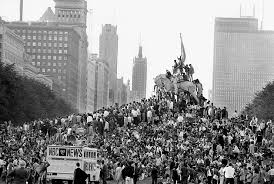
Will the 2024 Democratic Convention Be a Repeat of Chicago 1968?
As the 2024 Democratic National Convention approaches, parallels are being drawn to the infamous Chicago 1968 convention, a turning point in American political history marked by violent clashes between protesters and police, deep divisions within the Democratic Party, and a broader societal crisis. The question on many minds is whether the upcoming convention could see a similar level of turmoil, given the current political climate in the United States.
Table of Contents
Historical Context: The Chaos of Chicago 1968
The Democratic Convention in Chicago in 1968 is remembered as a watershed moment in American politics, reflecting the deep fissures within the nation during a time of war, civil rights struggles, and generational change. The Vietnam War had polarized the country, and the Democratic Party itself was deeply divided between supporters of the war and those advocating for immediate withdrawal.
Protesters descended on Chicago, demanding an end to the war and greater attention to civil rights issues. The response from law enforcement, under the direction of Chicago Mayor Richard J. Daley, was brutal, leading to violent clashes that were broadcast live on television. The images of police beating protesters with clubs and deploying tear gas shocked the nation and highlighted the growing divide between the government and the people.

Inside the convention hall, the Democratic Party struggled to present a united front. The nomination of Hubert Humphrey, who was seen as a continuation of President Lyndon B. Johnson’s pro-war policies, alienated many anti-war Democrats, further deepening the rift within the party. The chaos of the convention contributed to the perception of a party in disarray, which ultimately hurt the Democrats in the general election, leading to the victory of Republican candidate Richard Nixon.
The Current Political Landscape: A Nation Divided
Fast forward to 2024, and the United States finds itself once again deeply polarized. The country is grappling with a myriad of issues, including economic inequality, racial injustice, climate change, and the aftermath of the COVID-19 pandemic. The political landscape is characterized by sharp divisions, not only between Democrats and Republicans but also within the Democratic Party itself.
The progressive wing of the party has grown increasingly vocal, pushing for bold reforms on healthcare, climate action, and economic justice. Meanwhile, the more moderate faction, which includes many of the party’s establishment figures, advocates for a more incremental approach, fearing that radical changes could alienate centrist voters and jeopardize the party’s chances in the general election.
The potential for conflict at the 2024 Democratic Convention arises from these internal divisions. While the party’s leadership will undoubtedly strive to project unity, Chicago 1968 the underlying tensions could surface, particularly if the nomination process is contentious or if there is a perceived disconnect between the party’s platform and the demands of its base. Chicago 1968
The Role of Protest Movements: Echoes of 1968?
Just as in 1968, there is the potential for large-scale protests at the 2024 convention. Various activist groups, including those advocating for climate action, racial justice, and economic equality, are likely to use the convention as a platform to voice their demands. Chicago 1968 The question is whether these protests will be peaceful or if they could devolve into chaos reminiscent of the Chicago convention.
One key difference between now and 1968 is the role of social media. In 1968, television brought the violence of the Chicago protests into American living rooms, shocking the nation. Today, social media platforms allow for real-time dissemination of events, which could either amplify or mitigate the impact of protests depending on how they are covered and perceived.
Law enforcement’s response to potential protests will also be critical. In recent years, there have been numerous high-profile incidents of police violence against protesters, particularly during the Black Lives Matter demonstrations. The response to any protests at the 2024 convention will be closely watched and could significantly influence public opinion.
The Stakes for the Democratic Party
For the Democratic Party, the 2024 convention represents a crucial moment. The party must navigate its internal divisions while presenting a united front to the electorate. Chicago 1968 The stakes are high, as the outcome of the convention could have a significant impact on the general election.
If the convention is marred by conflict, either within the party or in the streets, it could reinforce perceptions of a party in disarray, much like in 1968. Chicago 1968 This could play into the hands of the Republican Party, which is likely to capitalize on any signs of Democratic weakness. Chicago 1968
However, if the party can manage its internal divisions and address the concerns of its base while maintaining order and discipline, the convention could serve as a powerful demonstration of Democratic unity and resolve. The key will be balancing the demands of the progressive wing with the need to appeal to a broader electorate.
Conclusion: Learning from History
While there are certainly parallels between the 2024 Democratic Convention and Chicago 1968, it is important to recognize the differences as well. The political and social context of 2024 is unique, and the Democratic Party has the benefit of hindsight. By learning from the mistakes of 1968, the party can work to avoid a repeat of that chaotic and divisive event.

Ultimately, the success of the 2024 convention will depend on the party’s ability to manage its internal divisions, respond effectively to potential protests, and present a coherent and compelling vision for the future. Whether it will be a repeat of 1968 remains to be seen, but the lessons of history will undoubtedly play a crucial role in shaping the outcome.







